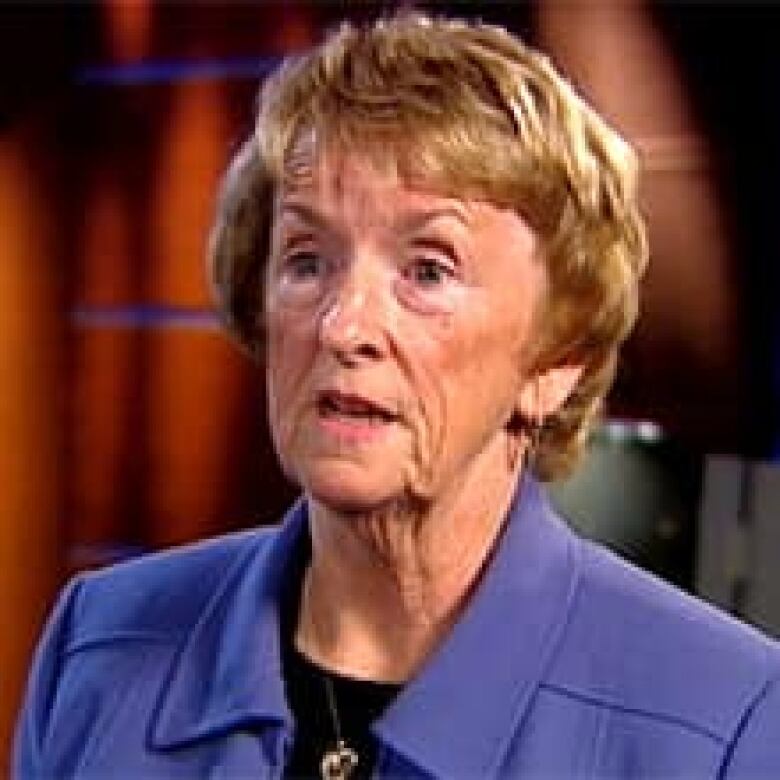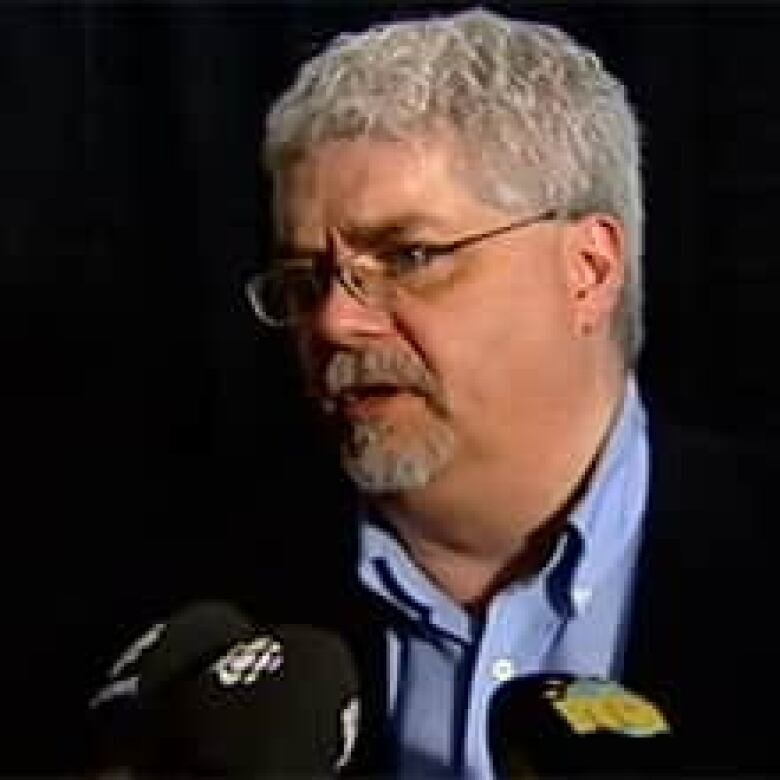Knocks against cancer advocates wrong: Eastern Health chair
The chair of Eastern Health says strong criticism of St. John's cancer advocates does notreflect the organization's work, the chair has testified.

Joan Dawe, testifying at the judicial inquiry on flawed breast cancer testing, distanced the Eastern Health board from a series of internal communications that knocked advocates who had been campaigning for more information about the scandal.
"From the perspective of the board, these comments, these sentiments are inappropriate," Dawe told Justice Margaret Cameron on Thursday.
Among the documents presented as exhibits included correspondence between Eastern Health managers in May 2007, when the authority was embroiled in a rapidly widening controversy about the extent of errors at its pathology lab.
"I had to turn off [NDP Leader] Lorraine Michaels [sic] and I couldn't bear to watchPeter Daweon Out of the Fog," wrote manager Heather Predham in an e-mail, referring to an interview that Dawe, the executive director of the Canadian Cancer Society's provincial division, gave to a local cable program.
The memo follows another e-mail by then communications director Susan Bonnell, who wrote, "There's a new level of fear and anxiety that Peter Dawe is creating and then blaming us for."
'Bullies' comment uncalled for: chair
Bonnell also likened Peter Dawe, cancer survivor Gerry Rogers and lawyer Ches Crosbie to "schoolyard bullies."
Predham, the assistant director of quality and risk management, wrote to Bonnell and others, "We should be out on rooftops clarifying this point [But] the other part of me is thinking we're only going to give them more fodder and that whatever we say, we'll fan the fires and it would be better to hold the no comment line."
Joan Dawe, who is not related to the Canadian Cancer Society executive director, said in her testimony that she did not agree with Bonnell's summations, and would be contacting the human resources department at Eastern Health.
She also attempted to smooth over any strained relations with the Canadian Cancer Society, which has had a critical role in the hormone receptor issue.
"The Canadian Cancer Society would be seen in this case to be partners and there may be times when there might be differences of opinion, but that's fine, that's healthy as well," Joan Dawe said.
"When I first heard and then saw these comments, yes, personally I think they're inappropriate."
Cancer Society accepts reaction
Peter Dawe told CBC News he welcomes that reaction, though he said he fears something else may have been at playin Eastern Health's management ranks.

"My fear all along was that this was indicative of a little deeper cultural issue within Eastern Health," Dawe said.
"If the board of trustees can look at that and satisfy themselves, that we are indeed a valued partner and looked on the same way, I think that's healthy for everybody."
The judicial inquiry into hormone receptor testing is examining how the St. John's pathology lab came to produce hundreds of botched results between 1997 and 2005.
The tests are used to help determine the best course of treatment for breast cancer patients. Hundreds of patients were wrongly excluded from being considered for Tamoxifen, the antihormonal drug that has been shown to improve a patient's odds of survival.
The inquiry, which began hearing evidence last week, has already heard that 108 patients whose tests were incorrecthave already died. It is not clear to what extent different therapies would have meant different outcomes.
Meanwhile, Dawe who testified Thursday for the second straight day said the board was often not told about red flags at the lab, and was given mixed messages about the lab's problems.
Patients felt ignored
The inquiry has already heard from patients who felt they were ignored as Eastern Health tried to figure out a public relations strategy.
Dawe told commission counsel lawyer Bern Coffey that she knew nothing about senior managers getting advice fromHealth Care Insurance Reciprocal of Canada, Eastern Health's insurer.
"Was it your view at least as chair of the board of trustees that the communication approach of Eastern Health should be determined by Hiroc's lawyer?" Coffey asked.
"Absolutely not," Dawe replied.
Not entirely confident in data, chair admits
Dawe said she relied on former chief executive officer George Tilley, who like other senior Eastern Health managers has yet to testify, for accurate details on the lab.
"I'm sure you sense from all I've said the last few days, it's been a challenging area for the board, and one we have less confidence in, in the information," she said.
Dawe admitted Thursday that she still is not sure of the accurate numbers.
The inquiry has been already presented with a great deal of documentation, particularly about what was known within Eastern Health about troubles at its lab.
Litigation fears highlighted again
One of the recurring issues has been how to communicate problems with lab results with patients. The inquiry has been told legal advice held that patients should be told over the phone, but not in writing, that their samples were being retested in Toronto.
Tilley passed along to colleagues a concern from board member and St. John's lawyer Bill Boyd.
Boyd had expressed concern that Health Minister Ross Wiseman was citing Eastern Health's reliance on legal advice.
"He must say more than that Eastern Health was advised by its lawyers not to disclose information," Boyd wrote to Tilley.
"That sounds very bad and makes it appear that we did deliberately mislead."
An exhibit entered into evidence at the inquiry shows that Eastern Health received advice from insurance lawyer Daniel Booneon Oct. 18,2005, to hold off on sending a letter to patients.
"I do not see how the letter advances the health care of the affected patients and increases our exposure to claims for damages. I would recommend against sending it," wrote Boone, describing his "initial reaction"regarding a proposed letter to patients.
During that month, Eastern Health had been contacting patients about the retests, and media reports had been published about the issue.
The inquiry has been told that in July 2005, Eastern Health communications officials had drafted news releases about the retests. For reasons that have not yetbeen disclosed, the authority held off on informing patients about what had happened.
Tilley resigned in July 2007, after a separate issue involving errors with radiology work in southern Newfoundland. Dawe told the inquiry that Tilley resigned after Wiseman expressed the government's "dissatisfaction" with the authority's leadership.












_(720p).jpg)


 OFFICIAL HD MUSIC VIDEO.jpg)
.jpg)



























































































